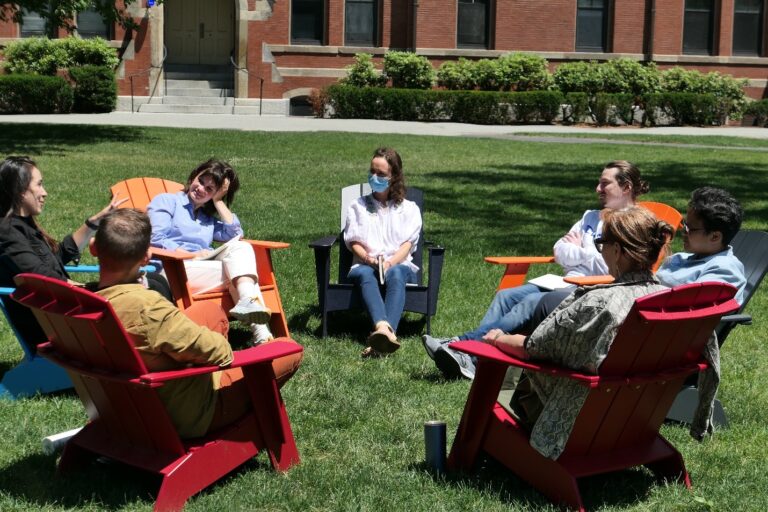Angie Bautista-Chavez and Stephanie Chan
1 November 2023

For Dr. Angie Bautista-Chavez (Arizona State College), a scholar of migration, borders, forms, and Latinx politics, and a first-generation school scholar from rural Texas, ICER’s mission was constant together with her commitments to create extra full accounts of American politics and to create fairer techniques for information manufacturing. For Dr. Stephanie Chan (Lafayette Faculty), a scholar who research racial politics, immigration, citizenship, and political participation, ICER was a key useful resource of experience and help in growing her e book challenge on racial incorporation and political participation of immigrant communities.
For each Bautista-Chavez and Chan—two ladies school of coloration from immigrant households who’ve been vilified in varied methods all through the USA and all through American historical past—CER isn’t just about growing analysis about communities of coloration and immigrant communities, however with communities of coloration and immigrant communities, and never simply deal with individuals of coloration and immigrants as topic the examine, but in addition acknowledges company and experience of individuals of coloration and immigrant communities. ICER was a transformative expertise wherein each Bautista-Chavez and Chan gained renewed confidence of their analysis, obtained suggestions on their analysis tasks, and developed a group of researchers with shared analysis commitments.
The ICER 2023 cohort was numerous, together with researchers from completely different racial and ethnic backgrounds and throughout completely different phases, together with doctoral college students, early profession researchers, adjunct school, and full professors. Members of the ICER 2023 cohort included Shelly Arsneault, Angie Bautista-Chavez, Jill Birren, Matilde Ceron, Stephanie Chan, Dang Do, Raychel Gadson, Curtis Kline, Rosa Krewson, Valerie Martinez-Ebers, Ankushi Mitra, Ashley Nickels, Rodrigo Nunes, Frank Reichert, Laurie Rice, Elizabeth Sharrow and Evelyn Simien. In the course of the Institute, ICER Fellows participated in giant group discussions and engaged with visitor audio system.
By small group conferences, ICER Fellows produced tangible analysis outcomes, together with early-stage brainstorming, refining analysis designs, pitching grant functions, and growing labor market supplies. These analysis advances had been aided via the numerous interdisciplinary, transversal and cross-institutional mentoring that occurred each formally and informally all through ICER. With all these efforts, cohort members pushed the boundaries of what CER can seem like and the kinds of insights it may possibly supply political science.
All through their time collectively, ICER 2023 cohort members mentioned the standing and way forward for CER in political science. A key theme within the ICER 2023 cohort discussions centered on experience coverage. On the coronary heart of those debates was the query of how political science analysis has at all times been and continues to be certain up in energy relations. Political scientists working around the globe already draw on the experience of area people members and group leaders. By having direct conversations about whose information thought-about precious, and by naming the express and implicit relationships between researchers and society, CER is a mode of data manufacturing that requires researchers to credit score the sources of data and makes researchers liable for offering mutual advantages.
“(…) Since students of coloration have lengthy confronted disproportionate skilled penalties for doing scholarship that’s socially engaged, the editors are additionally dedicated to exhibiting variety amongst students.”One other foremost theme within the discussions was the position of CER in bettering rigor of political science analysis. As political scientists flip their consideration to documenting, explaining, and addressing democratic erosion in the USA and the rise of authoritarianism worldwide, CER is a method via which researchers can, with Dr. Within the phrases of Valeria Sinclair-Chapman, be taught from “individuals who dwell with the uncooked contradictions of democracy.”
Lastly, the cohort addressed the precise prices and challenges of performing CER. Conducting moral and rigorous CER is useful resource intensive and requires a big period of time, iterative challenge improvement, relationship constructing, and extra. Conventional promotion and tenure requirements that reward numerous publications inside a short while body due to this fact act to discourage CER. It’s essential for researchers to make their work and its impression readable to tutorial establishments, and for educational establishments to put money into and reward CER.
On the final day of the Summer time Institute, ICER Fellows met for a remaining spherical of small group conferences, and there was basic settlement amongst Fellows that it will be helpful to have a information on learn how to conduct moral and rigorous community-engaged analysis, particularly in an period of contentious politics, resistance and reckoning and the erosion of the legitimacy of political establishments. By a mixed effort, the cohort succeeded in updating a particular problem on community-engaged analysis.
Political scientists throughout subfields are inspired to submit a manuscript to Politics, teams and identities Particular Situation on “ conduct civically engaged analysis in an age of contentious politics.” The particular problem will handle the ethics, analysis design, methodology, and challenge administration concerned within the improvement, implementation, and dissemination of outcomes from civically engaged analysis. Constructing on the numerous contributions of earlier cohorts to contextualizing, defining, and motivating CER, this particular problem is dedicated to to showcase exemplary circumstances of CER, reveal methodological pluralism in CER, together with scholarship throughout epistemological traditions, and heart academic-society analysis relationships grounded in a various world context.Lastly, as students of coloration have lengthy confronted disproportionate skilled penalties for performing scholarship that’s socially engaged, the editors are additionally dedicated to exhibiting variety amongst students.
Paper submissions for this particular problem are due by December 31, 2023. The editor of the particular problem is Dr. Shelly Arsneault (California State College, Fullerton), Angie Bautista-Chavez (Arizona State College), Stephanie Chan (Lafayette Faculty) and Valerie Martinez-Ebers (College of North Texas). We encourage researchers to affix us in investing in CER.

